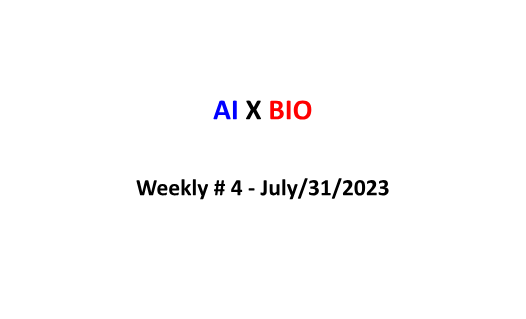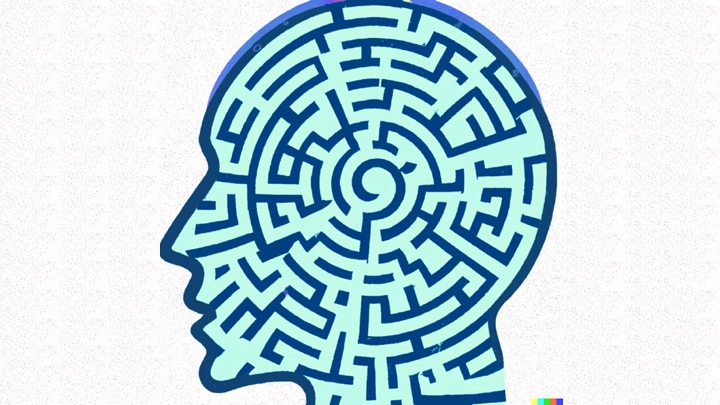- AIXBIO
- Posts
- AIXBIO Weekly #4 - July /31/23
AIXBIO Weekly #4 - July /31/23

Featured
Microsoft, Anthropic, Google, and OpenAI Launch Frontier Model Forum for Responsible AI Development
In a significant move towards responsible AI development, Microsoft, Anthropic, Google, and OpenAI have announced the formation of the Frontier Model Forum. This new industry body aims to ensure the safe and responsible development of frontier AI models, which are large-scale machine-learning models that exceed the capabilities of the most advanced existing models. The forum will focus on advancing AI safety research, identifying best practices for responsible AI development, collaborating with policymakers, academics, civil society, and companies to share knowledge about trust and safety risks, and supporting efforts to develop applications that can help meet society’s greatest challenges.
The Frontier Model Forum will draw on the technical and operational expertise of its member companies to benefit the entire AI ecosystem. It will work on developing a public library of solutions to support industry best practices and standards. The forum also plans to establish an Advisory Board to guide its strategy and priorities. It welcomes participation from other organizations developing frontier AI models willing to collaborate towards the safe advancement of these models.
The forum will focus on three key areas over the coming year:
identifying best practices, advancing AI safety research, and facilitating information sharing among companies and governments.
The forum will follow best practices in responsible disclosure from areas such as cybersecurity. The Frontier Model Forum is a significant step towards ensuring that AI technology is safe, secure, and remains under human control
Partnerships
CareCloud and Google Cloud Join Forces to Introduce Generative AI in Ambulatory Healthcare Settings
CareCloud, a company in healthcare technology solutions, has announced a collaboration with Google Cloud to bring generative artificial intelligence (AI) to ambulatory practices in office settings
This partnership aims to bring groundbreaking advancements to small and medium-sized healthcare providers, often facing resource constraints. The integration will enable physicians using CareCloud solutions to ask complex questions, gain valuable insights, and receive evidence-based recommendations by analyzing large amounts of patient data while complying with privacy laws.
#HealthcareTechnology #GenerativeAI #GoogleCloud #CareCloud #AIinHealthcare #AI
AWS Unveils HealthScribe, AI-Driven Clinical Documentation Service
AWS HealthScribe, a new HIPAA-eligible service, uses speech recognition & generative AI to create preliminary clinical documentation from patient-clinician conversations. The service, announced at AWS Summit New York, allows healthcare software providers to use a single API to create transcripts, extract key details, and create summaries that can be entered into an EHR system.
#AWSHealthScribe #AIinHealthcare #ClinicalDocumentation #EHR #PatientCare
Diagnostics
AI Proves Its Mettle in the Clinic: Accurate Heart Failure Evaluations
In a groundbreaking clinical trial, an AI algorithm, EchoNet, has demonstrated its ability to accurately read echocardiograms and work seamlessly with healthcare practitioners.
Developed at Stanford University, EchoNet was tested in a randomized clinical trial where it traced the size of the heart ventricle more accurately and faster than human sonographers. The algorithm's accuracy is expected to lead to better patient outcomes by providing more precise evaluations of heart failure progression. Furthermore, EchoNet's efficiency could significantly increase the productivity of sonographers. This trial is one of the first of its kind in the cardiology space and could set a new standard for testing medical AI algorithms in the future. EchoNet is currently in the process of gaining FDA approval, with plans for broad deployment across many hospitals beyond Stanford and Cedars-Sinai. #AI #Healthcare #Cardiology #StanfordHAI
FDA Grants Clearance for UltraSight's AI-Powered Cardiac Ultrasound Technology
UltraSight has recently received clearance from the FDA for its innovative ultrasound guidance technology, powered by artificial intelligence. This groundbreaking technology is designed to assist healthcare professionals, even those without extensive sonography experience, in acquiring high-quality cardiac ultrasound images. This capability is crucial for point-of-care settings, making it possible to detect heart disease more widely and provide easier access to cardiac monitoring for patients.
#HealthTech #FDA
Drug Development
Generative AI Constructs Novel Protein Structures Beyond Nature's Designs
MIT's Computer Science and Artificial Intelligence Laboratory (CSAIL) researchers have developed a computational tool, FrameDiff, that designs novel protein structures surpassing those found in nature.
FrameDiff uses machine learning to generate mathematical frames that align with protein structures' inherent properties, enabling it to construct new proteins independently of pre-existing designs. This could lead to more efficient protein engineering, potentially accelerating the development of vaccines, drugs, and gene editing technologies. The researchers believe that improving FrameDiff's training on more substantial data and enhancing its optimization process could generate foundational structures with design capabilities on par with RFdiffusion, a protein structure prediction tool. This research, which is still in its early stages, represents a significant step toward overcoming the limitations of current structure prediction models.
#AI #MachineLearning #ProteinEngineering #Healthcare #Pharmaceuticals #DrugDiscovery
Ethics & Regulation
A Comprehensive Blueprint for AI Integration in Psychotherapy
The potential of AI in psychotherapy is vast, but its deployment needs to be handled responsibly and with great care. A new working paper by a multidisciplinary team of researchers outlines the potential benefits and concerns of deploying AI in psychotherapy.
AI can serve as a 'supercharged secretary', assisting clinicians with intake interviews, documentation, notes, and other basic tasks, thereby freeing up clinicians to focus on diagnosis, treatment conceptualization, and big-picture insights. For patients, AI can make between-session tasks, like practice worksheets and activities, more engaging and dynamic. Furthermore, AI can significantly enhance the scientific and experimental foundations of therapeutic approaches.
Urgent Call for AI Regulation: A Statement from the Future of Life Institute
The Future of Life Institute has issued a statement calling for immediate regulation of advanced AI systems. The institute warns that these systems could exacerbate existing issues such as discrimination and disinformation, and could pose catastrophic and even existential risks due to misuse, unintended consequences, or misalignment with our ethics and values.
The institute implores Congress to regulate these systems before they cause irreparable damage. They propose five principles for effective oversight:
Legal and technical mechanisms for the federal government to implement an immediate pause on the development of AI more powerful than GPT-4.
Requiring registration for large groups of computational resources, which will allow regulators to monitor the development of powerful AI systems.
Establishing a rigorous process for auditing risks and biases of these systems.
Requiring approval and licenses for the deployment of powerful AI systems, contingent upon developers proving their systems are safe, secure, and ethical.
Clear red lines about what risks are intolerable under any circumstances.
The EU AI Act: A Potential Game-Changer for Regulating Foundation Models
OpenAI's GPT-3.5, a foundation model, exhibits human-level performance & has the potential for task automation & content creation. However, its rapid advancement raises concerns. The EU AI Act doesn't cover these models, but the European Parliament is working on solutions. The article suggests that the AI Act should only apply to companies that have developed the most capable foundation models, to avoid stifling innovation in smaller companies.
#AI #EUAIAct #OpenAI #Regulation






